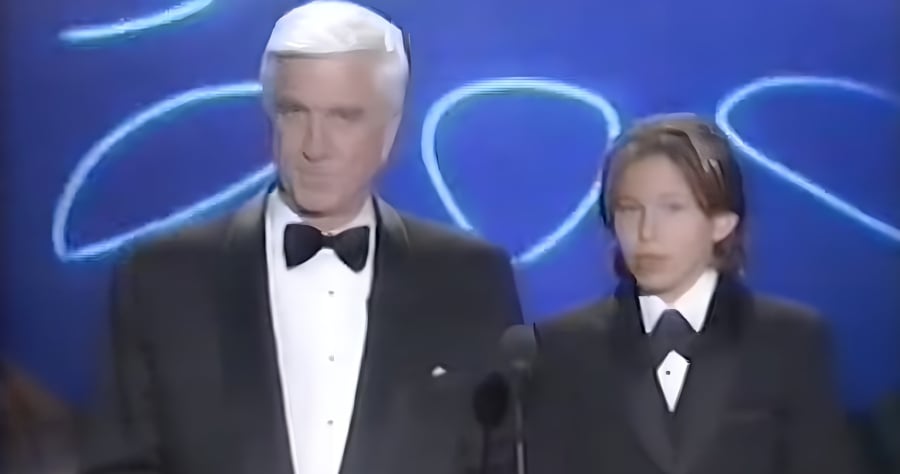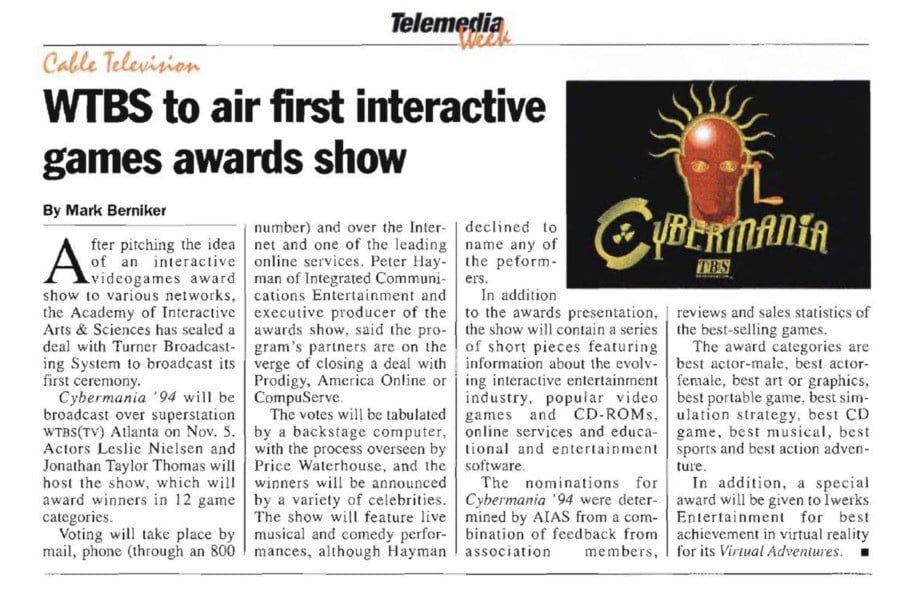
It's that time of the year when the Game Awards roll around to try and provide the industry with a glossy video game alternative to the Oscars. But what you might not realize is that it wasn't actually the first attempt to combine video games with a big-budget televisual award format. Or even the first award show to include Geoff Keighley as part of the production team.
No, that honour instead goes to TBS and the Interactive Academy of Arts & Sciences' Cybermania '94, an event that took place on November 5th, 1994 at the Universal Amphitheater in Los Angeles, which featured the participation of a fifteen-year-old Keighley as an "interactive product specialist" – a job that he got through his parents that basically meant writing the blurbs for the games that were nominated on the night.
Today, the almost 2-hour award show can be viewed in full on YouTube, thanks to various uploaders, and makes for an awkward yet fascinating watch. Not only because of the bizarre cast of celebrities that were booked to appear at the event (the show was hosted by Leslie Nielsen and Jonathan Taylor Thomas and featured appearances from Hillary Swank, Matthew Perry, and the Barbarian Brothers) but because of the baffling comedy segments that appeared in between the different awards and the sometimes-bewildering choice of winners. As a result, we wanted to take a quick look back at the event, to explore how it originally came to be, what it was like to attend, and what the reaction was to it at the time.
Our story starts with Andrew Zucker, an entertainment lawyer who at the time was working across TV, music, and children's animation. One night, while watching the Emmys in 1991, Zucker witnessed the hosts introduce an elderly man onto the stage, who turned out to be Syd Cassyd, the founder of the Academy of Television Arts & Sciences. This led him to start thinking about what the television landscape must have been like when Cassyd first introduced the Academy back in 1946 and made him realize it was probably in the same place that the video game industry was in at the time. Because of this, he thought it might be interesting to start his own academy to represent those working across video games and the interactive arts, in the hopes that it might "take off in the same fashion".
This eventually led to the foundation of the Interactive Academy of Arts and Sciences that same year, and the idea to host their own video game award show.
In 1993, the academy announced plans to hold a self-funded event the following year, called The Ajax, which was scheduled to take place in May 1994 at the Hollywood Pantages Theatre. However, this event was quietly abandoned, and after a period of relative silence, was later retooled into a more television-friendly format, which would later be pitched to networks and picked by TBS.

Cybermania '94, as this new event was called, was scheduled to take place at Universal Studios on November 5th, 1994, and would see the academy’s members voting for their favourite games from across 50 categories, with only 12 of these expected to be awarded live on the show (the rest would be displayed as part of a "crawl" at the bottom of the screen). Viewers at home could also get involved with the voting too, with the organizers of the event encouraging fans to log into the online service Prodigy or contact a toll-free number, to help them to vote on a list of 9 nominees for the "Best Overall Game".
It looked as if video games were finally going to get their own glamorous award show, with the producers behind the event even going to the trouble of booking various '90s celebrities to lend some further star power to proceedings. However, the finished result ended up leaving a lot to be desired, with the tone varying wildly between the humble and heartfelt acceptance speeches and the endless slapstick segments that included onstage wrestling, stunt work, and balloon dancing.

To make matters worse, many of the award winners didn't even know the show was going to be televised until they turned up on the night and had cameras thrust in their faces. This includes Dan Feinstein, a producer at Acclaim at the time, who told us:
"Mortal Kombat and NBA Jam, they were both up for Game of the Year that year — I didn’t even know that there was a thing before that — but the producer Asif Chaudhry and I were sent off to LA to pick up an award. And because there hadn’t been any awards before, we thought we were just picking it up at somebody’s office and shaking their hand, and taking it back home.
"We were directed to go to Universal Studios — and this was overnight. So they flew us out and we went to Universal Studios and we were dressed in t-shirts and torn-up jeans and they direct us into this big theatre with I don’t know how many hundreds and hundreds of people in monkey suits and women in gowns. It was like people in the movie industry and anyone who owned a game company.
"I was like, ‘Well, I don’t think we’ll have to go up there, what are the chances of us actually winning anything?’ We won Game of the Year.
"We had to go up in our ripped-up jeans and t-shirts and accept the award from Leslie Nielsen [and Jonathan Taylor Thomas from Home Improvement]. Beautiful spokesmodels brought us onto the stage and off and we had to say something off the top of our heads. We had no idea we were walking into an event like that.
"Anyway, they threw us off of the stage into a tent behind the building and cameras are going off and people are sticking video cameras in our face, asking ‘What do you think of violence in video games?’ I said, ‘I’m all for it’."
Similar to Feinstein, the Myst co-creator Rand Miller, who took home an award for Best Art and Graphics in an Interactive Product, also described the show as "strange and surreal", when we spoke to him about it earlier this year.
He argued that the event was a "transitional" one in the history of video games and has memories of capping off the night by taking a trip around the Universal Theme Park, where he ended up getting ridiculously sick after riding a motion simulator.
"When you were in the gaming industry, especially back then, everything felt, how do I put it? Like T-shirts and shorts. It was very low-key and the gaming award shows were all pretty whatever. So it was a little strange because of that. It was this attempt to be a little more elegant, but there was this clash of cultures in some ways.
"I remember, you know, at some point they let people know, ‘Oh, you probably should be there.’ And so, my brother and I flew down and we didn't know a lot about it. And then it was like, ‘Oh, this is a fancy award show thing.'
"We got to wander around the amusement park area and I remember going on one of those motion rides that had cameras on it. I got so sick. I was like nauseous for hours wandering around the park. It was all a strange and surreal experience."
In the aftermath of Cybermania '94, it wasn't just the developers who were struggling to make sense of what they had just witnessed. The press also understandably had a lot to say about the award show.
The writer Jeremy Berg, for instance, criticized the awards in a 2-page article for Computer Player magazine, where he slammed the inconsistent tone, and implied that because multi-media companies had to pay to enter their games, awards were simply being given out based on how much publishers were willing to pay to see their games on Turner Broadcasting.
Meanwhile, the video game journalist Bill Kunkel criticized the overall presentation of the show in the magazine Electronic Games, ultimately stating, "I’ve performed many valiant acts in my time as a game journalist […] but never have I had to endure anything like TBS’ horrendous Cybermania ’94, the first televised attempt to integrate electronic games and the tired TV award show format."
By almost all metrics, Cybermania '94 had proven to be a colossal failure, but the academy didn't give up there. They would later go on to hold a follow-up event, The Second Annual AIAS Awards, on Bravo on April 17th, 1996, which would again struggle to find an audience, before going on to create the significantly more successful Interactive Achievement Awards (later renamed to the D.I.C.E Awards) in 1998.
If you're interested, you can watch Cybermania '94 here.
